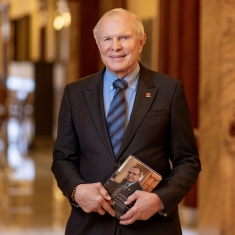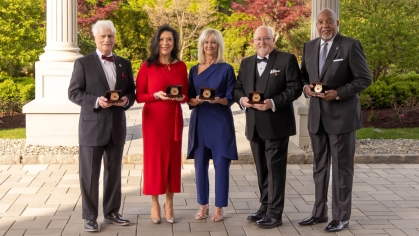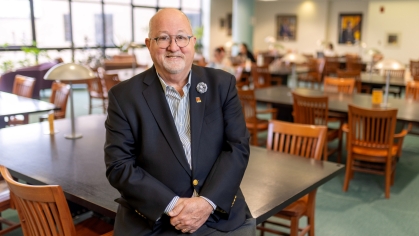Longtime Legislator’s Influence Resonates in the Garden State

Senator Raymond Lesniak, who served 40 years in the New Jersey Legislature championing groundbreaking legislation, will be inducted into the Rutgers Hall of Distinguished Alumni.
The fight hasn’t gone out of Ray Lesniak yet.
“Not only do I not back away from a fight, I cherish it,” Lesniak RC’71 says with a sly grin. “All my life, the bigger the challenge, the more it attracted me. That’s one way to succeed—it can also be a good way to go to oblivion, of course.”
But throughout his decades in New Jersey politics, the fights he couldn’t resist rarely led to disaster for Lesniak.

Usually, they led to election night triumphs and the passage of landmark progressive legislation that protected the environment, ended the death penalty, and advanced marriage equality in the state—often long before the rest of the country was ready to embrace those causes.
New Jersey’s ultimate political macher, Lesniak, 77, served as a state assemblyman from 1978 to 1983, and as a state senator for 35 years after that. For years, he was New Jersey State Democratic chair—the boss of the state’s dominant political party—and he was the New Jersey chair of President Bill Clinton’s 1996 reelection campaign. (When Rutgers University Press published his 2022 memoir—Cultivating Justice in the Garden State: My Life in the Colorful World of New Jersey Politics—Clinton wrote the foreword.)
Lesniak, who is now founder and president of the Lesniak Institute for American Leadership at Kean University, will be will be inducted into the Rutgers Hall of Distinguished Alumni on April 25.
‘Rutgers Never Gave Up on Me’
A native of Elizabeth, New Jersey, he was born in the Elizabethport neighborhood in the shadow of the Bethlehem Steel plant. He grew up in a part of the city’s tight-knit Polish immigrant community in the Bayway neighborhood and was the first in his family to graduate college. That was a struggle, but he persevered.
He began his studies in 1964 at Rutgers College before transferring to the School of Engineering, under the tutelage of physicist Professor Richard Plano. While playing on the freshman football team, he injured his knee and was obliged to drop out in 1965 to undergo surgery. No longer a student, he was drafted into the Army—although the bum knee kept him from serving.
Lesniak returned to Rutgers but struggled academically and dropped out again—and was promptly drafted again in 1967. This time, his knee recovered, he was assigned to the Army’s Special Services Division to play for the Fort Dix baseball and football teams.
After a period of soul-searching in uniform, he returned to Rutgers one more time, thanks to the G.I. Bill. He graduated with a degree in economics in 1971. “Rutgers always took me back,” he says now. “Rutgers never gave up on me—so neither did I.”
Degree in hand, Lesniak went on to St. John’s Law School, and after a brief stint with the State Office of Legal Services, he dove into politics with his first run for assemblyman in 1978.
Political Brawls
Lesniak fought a number of political brawls during all his years in the Statehouse; several are now the stuff of New Jersey political legend.

Lesniak spent five years fighting to legalize sports betting at racetracks and casinos, taking on first the U.S. Department of Justice, then Governor Chris Christie, the NFL and NCAA, and ultimately the United States Supreme Court to finally legalize the practice in 2018.
His feud with a longtime mayor of the city of Elizabeth percolated for years, ending only when, thanks to Lesniak’s backing, a city Little League umpire who had been fired in retaliation for volunteering on one of Lesniak’s early campaigns became mayor. That mayor, J. Christian Bollwage, continues to serve, eight terms and 30 years later.
In his memoir—a rollicking ride though the colorful circus of Garden State politics past and present—a description of the Byzantine machinations undertaken by a county political leader to make Lesniak the “Democratic line” candidate for assembly in his first election takes two full pages. Once ensconced in the halls of power, Lesniak consistently used his position to aid the less powerful and preserve the state’s natural resources.
He got his start in progressive causes by aiding then-Governor Brendan Byrne with his fight to protect the Pine Barrens from development in 1979. Lesniak decided to sell the public on the value of the pristine wilderness—and legislation aimed at protecting it—by taking two reporters for a canoe ride down the Mullica River.
The fact that Lesniak had no canoeing experience at all did not deter him. “I could swim,” he recalls with a shrug.
He ended up spilling his journalist passengers into the river—twice. The resulting story on a full page of The Star-Ledger was headlined: “You can take the boy out of the city, but you can’t take the city out of the boy.” It garnered enormous attention, and Byrne’s legislation passed.
In 1980, the explosion at an industrial site in Elizabeth—and subsequent fire that saw barrels of chemicals bursting into flames in the Arthur Kill—spurred Lesniak to work for the passage of environmental laws including the Environmental Cleanup Responsibility Act (now known as the Industrial Site Recovery Act) and the Safe Drinking Water Act.
An Active ‘Retirement’
Although he retired from the Statehouse in 2018, “I couldn’t just walk away from all that and play golf,” Lesniak says.
He has established the Lesniak institute at Kean University that aims to develop the skills of the next generation of political fighters through classes and lectures on effective advocacy, often taught by Lesniak himself.

He also created The Raymond J. Lesniak Experience, Strength and Hope Recovery High School in Roselle for high school students in recovery from drug and alcohol addiction. And he’s still devoted to the cause of animal rights; he’s currently involved in legal action to reform the Fish and Game Council, a part of the Department of Environmental Protection.
He’s also a proud owner of a rescue pet, his dog Samantha. Lesniak was honored by the Humane Society of the United States at St. Hubert’s Animal Welfare Center in Madison, New Jersey. When he picked up the award, he was handed a puppy to hold while he posed for a picture. “It was a setup job,” he says now. “I couldn’t leave without her.”
In addition to his memoir published in 2022, he authored The Road to Abolition: How New Jersey Abolished the Death Penalty and Beating the Odds: The Epic Battle That Brought Legal Sports Betting Across America. He also coauthored What’s Love Got to Do with It: The Case for Same Sex Marriage.
He has plans for work still to come—and maybe a couple more uphill battles left to fight. “I will continue to be an advocate for social justice,” Lesniak says. “Politics all around the world have swung to the right, and now it’s important for all of us to fight back. I’m not done yet.”
Lesniak is one of five new inductees who will be formally enshrined in the Rutgers Hall of Distinguished Alumni in a ceremony starting at 6 p.m. Thursday, April 25, at the Stone House at Stirling Ridge in Warren, New Jersey. Registration for the ceremony closes on April 8. For more information, visit the Hall of Distinguished Alumni page.
Nominator’s Remarks

“Senator Lesniak is a New Jersey legend. His legislative career has set multiple national benchmarks in environmental protection, criminal justice reform, animal protection, economic development, and LGBTQ rights.” —Sarah Mack, former executive director of the Lesniak Institute for American Leadership

WE ARE YOU is an ongoing series of stories about the people who embody Rutgers University’s unwavering commitment to academic excellence, building community, and the common good.


